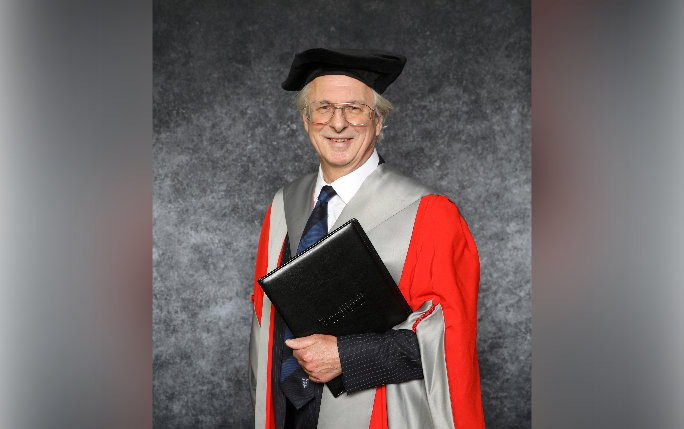Lord Trees awarded honorary degree

The University of Liverpool Veterinary Alumni Association send their congratulations to Professor the Lord Sandy Trees, who has been awarded an honorary Doctor of Veterinary Science degree by the University of Liverpool following a nomination from the Association.
Sandy Trees graduated in 1969 from the Royal (Dick) School of Veterinary Studies, Edinburgh. Following a research expedition to Kenya and a year in mixed general practice, Sandy completed a PhD on bovine babesiosis, and then worked at Elanco (Rome) as veterinary advisor.
In 1980 he was appointed Lecturer in Veterinary Parasitology at the University of Liverpool, based in the Liverpool School of Tropical Medicine, became Professor of Veterinary Parasitology in 1994 and then Dean of Liverpool’s Faculty of Veterinary Science from 2001 until 2008. During Sandy’s tenure as Dean there were a number of highlights including the establishment of the Bioveterinary Science degree (2001), the centenary of the School of Veterinary Science (2004) and the construction of a new £9.6 million Small Animal Teaching Hospital at Leahurst (2007). After the Deanship but before retirement from the University, he served as President of the RCVS in 2009-2010.
As a parasitologist, Sandy has contributed to research that impacts both human and animal health. In collaboration with Professor Diana Williams, the veterinary parasitology group made major contributions to the understanding and control of the newly discovered protozoan pathogen, Neospora caninum in dogs and cattle. Relevant to human health in the Tropics, working with Ben Makepeace (now Professor Makepeace) and other British and international colleagues from Germany and Cameroon, he pioneered the use of the African cattle parasite, Onchocerca ochengi as an experimental model to research chemotherapy and vaccine development for the human cause of River Blindness, O. volvulus. Amongst other things, they were able to show that antibiotic therapy could kill adult worms through the action on endosymbiotic bacteria in the worms. In the early 1990s Sandy’s research into endemic and exotic parasitic diseases of companion animals led to the formation of Test-a-Pet. This parasitology diagnostic service at the University, used by vets in practice, still exists today and is now known as Liverpool Veterinary Parasitology Diagnostics (LVPD). Veterinary Parasitology teaching at the University of Liverpool is often discussed at alumni events, and Sandy’s teaching is remembered fondly.
Retiring from the University of Liverpool in 2011, in 2012 Sandy became the second ever veterinary surgeon to be appointed a life peer to sit on the crossbenches in the House of Lords. He takes an active interest in policy related to the full remit of the veterinary profession and his background in education, science and research allows him to contribute to this meaningfully. He has been particularly active in areas such as welfare of animals at slaughter, bovine tuberculosis, dog breeding, and the equine industry. In 2016 Trees was elected an Honorary Fellow of the Royal Society of Edinburgh, the RSE’s highest class of Fellowship, and in 2019 he was awarded the Queen’s Medal by the Royal College of Veterinary Surgeons. He is a Fellow of the Academy of Medical Sciences and FRCVS.
Sandy is still a strong supporter of the University, the School of Veterinary Science, and parasitology research. In 2015 he co-chaired the 25th World Association for the Advancement of Veterinary Parasitology (WAAVP) conference which was hosted in Liverpool. In 2017, Lord Trees returned to the University to deliver the inaugural Barrie Edwards Memorial Lecture on his time in the House of Lords, and the Lord Trees Bar at Leahurst is named after him.
On receiving the award Sandy said: “It is a great and singular honour to receive the degree of Doctor of Veterinary Science (honoris causa) from such a great university and vet school, in which I very happily worked for 31 years.”
The University of Liverpool has at its heart a wish to advance learning and ennoble life, and Sandy is the perfect embodiment of these principles. He has been, and is, an advocate for the veterinary profession and animal welfare, but he is also a veterinary scientist, a teacher and a worthy recipient of an honorary degree.